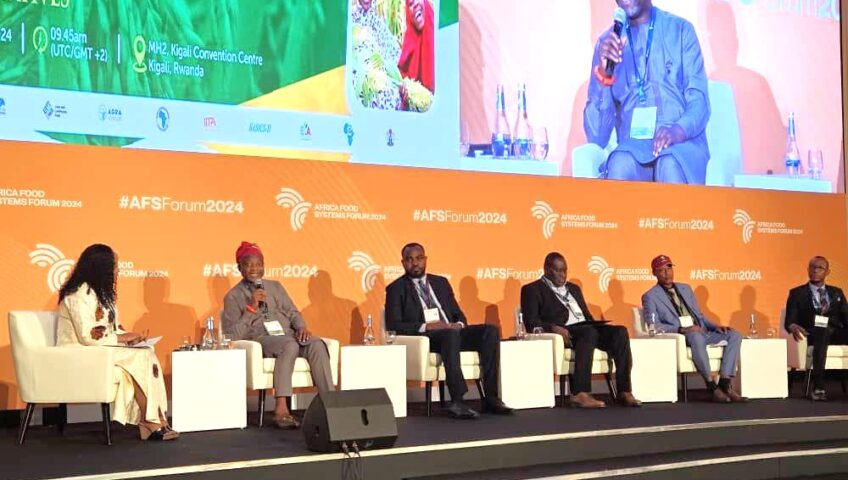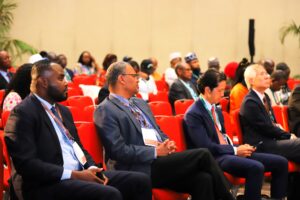The Building an Economically Sustainable Integrated Cassava Seed System, Phase 2 (BASICS-II) of the International Institution of Tropical Agriculture (IITA) recently highlighted some of the transformative impact it is having on Africa’s food system, job creation, and climate change adaptation. The Project Manager, Prof Lateef Sanni, presented the scorecard at a side event organised as part of the just concluded Africa Food Systems Forum (AFSF) in Kigali, Rwanda.
The Side event was organised by the Sasakawa Africa Association (SAA) in conjunction with the Islamic Development Bank (IsDB), AGRA Nigeria, and African Development Bank (AfDB) and the BASICS-II Project. The side event was held on September 2 2024 at the Kigali Convention Centre, the venue of the AFSF – a forum which had over 5000 delegates from around the world converge on the Rwandan capital for the theme, Innovate, Accelerate and Scale: Delivering Food Systems Transformation in a Digital and Climate Era.
Prof Lateef Sanni, who was one of the panelists on the side event, noted that the project was contributing immensely to food systems transformation and climate adaptation by promoting the use of improved cassava varieties with better food value, greater yield, disease resistance and environmental resilience.
“In making these varieties available, we’ve created a sustainable system and value chain where building from the breeders, we are strengthening foundation seed producers and creating Cassava Seed Entrepreneurs who are making money as they provide quality cassava stems of improved varieties to farmers and processors,” he said.
Sanni spoke on a panel that had leaders of other food system interventions. They include Dr Rufus Idris (Country Director, AGRA Nigeria); Dr Mel Oluoch (Director for Strategic Partnerships, Sasakawa Africa Association), Dr Solomon Gizaw (Head of TAAT ClearingHouse) and Abdulrasheed Hamisu Kofarmata (SAA Project Coordinator, Kano State Agropastoral Development Project).
Speaking further, the project boss explained that BASICS-II leveraged the Semi Autotrophic Hydroponics (SAH) technology to accelerate the multiplication of newly released varieties.
“We are in an era where we need to accelerate processes to address pressing food demands and poverty crisis in Africa,” he said. “So, one of the innovative approaches we adopted was to leverage the Semi Autotrophic Hydroponics (SAH) technology to rapidly multiply varieties as they are released. Innovative production technologies like pencil stems are also helping to ramp up the production of stems and simplifying the transportation of planting materials.”
He noted that the creation of Cassava Seed Entrepreneurs across the country was contributing to income generation, poverty alleviation and women empowerment. “More than 40 percent of the seed entrepreneurs thriving through as seed entrepreneurs are women” he added.
The side event was attended by the President of the Sasakawa Africa Association, Dr Makoto Kitanaka the Country Director of SAA Nigeria, Dr Godwin Atser; and the Commissioner for Agriculture and Natural Resources in Kano State Nigeria, Dr Danjuma Mahmoud, who represented the Kano State governor, Engr Abba Yusuf. Also in attendance were Lawrence Kent, Senior Program Officer with the Bill and Melinda Gates Foundation; Dr Biola Kazeem Badmos, Senior Agriculture and Food Security Specialist with the IsDB; Prof Sule Ochai, a senior policy consultant with the AfDB who represented Dr. Martin Fregene, Director, Agriculture and Agro-Industry of the AfDB.
Participants at the event hailed the project for its sustainability plans which include the creation of independently run and private sector led Cassava Seed Entrepreneurs’ networks and a linkage to regulatory agents like the National Agricultural Seed Council (NASC) for quality control.
Prof Sanni concluded by calling on financial institutions to make funds available to seed producers to help them scale production.


